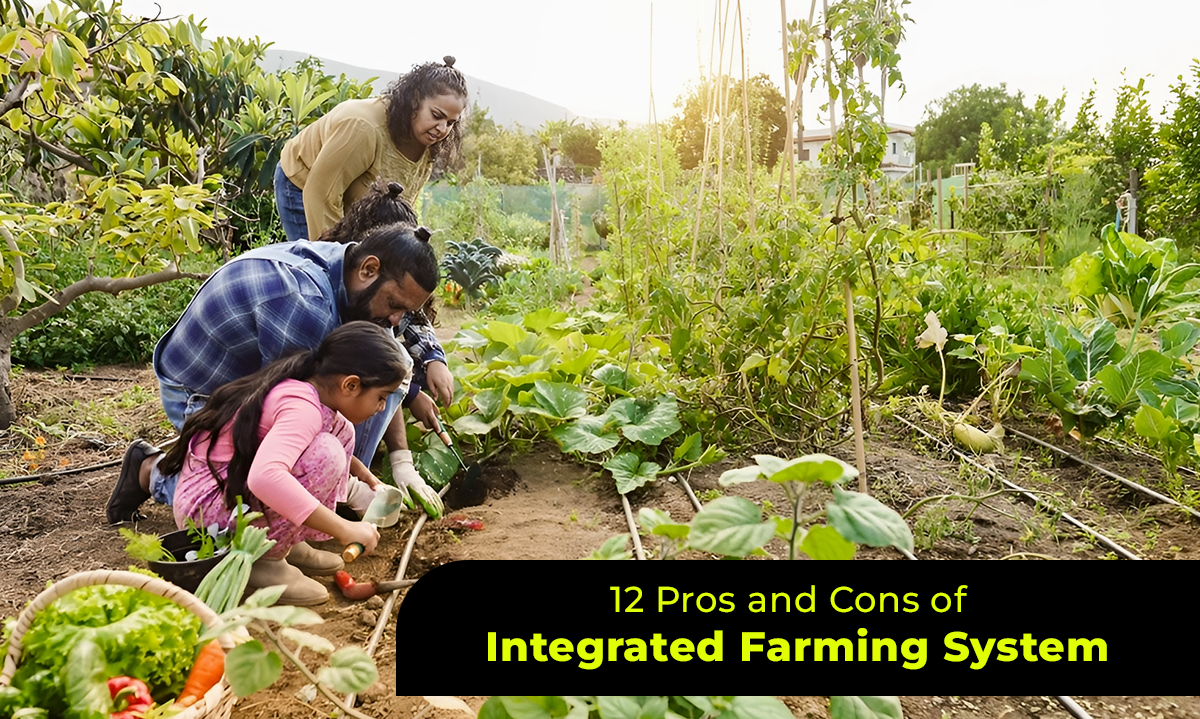12 Pros And Cons Of Integrated Farming Systems

With the contemporary farming method, the Integrated Farming system is in the limelight at the agriculture forum. Integrated farming thrives to establish a productive and sustainable system by merging different agricultural practices including crop production, raising livestock, aquaculture, and agroforestry. This blog post will be discussing about 12 major pros and drawbacks of IFS for the folks who are interested in the Sustainable Integrated Farming System.
Pros of Integrated Farming System:
Diversification: Integrated farming encourages diversification by combining multiple agricultural activities on a single farm. This diversity not only minimizes risks associated with monoculture but also promotes resilience against pests, diseases, and market fluctuations.
Revenue Streams in Hydroponic Farming:
Resource Efficiency: By utilizing resources such as land, water, and nutrients more efficiently, integrated farming maximizes productivity while minimizing waste. For example, crop residues can be used as feed for livestock, and animal manure can fertilize crops, creating a closed-loop system.
Improved Soil Health: Incorporating crop rotation, intercropping, and agroforestry practices enhances soil structure, fertility, and moisture retention. This results in reduced soil erosion, increased organic matter content, and improved nutrient cycling, leading to sustainable soil health.
Enhanced Biodiversity: By offering homes for a variety of plant and animal species, integrated agricultural systems enhance biodiversity. Specifically, agroforestry maintains wildlife corridors and creates microenvironments that are advantageous to birds, small animals, and beneficial insects.
Climate Resilience: Whether your region has extreme weather, droughts, or heatwaves, Integrated Farming Systems are more resilient to climate change due to its diversification and resource efficiency. For example, agroforestry can control microclimates and reduce carbon emissions.
Economic Viability: CBy generating multiple streams of income from diverse agricultural activities, integrated farming systems can improve farm profitability and financial stability. This reduces dependency on a single commodity market and enhances farmers' resilience to market fluctuations.
Reduced Input Costs: Integrated farming relies less on external inputs such as chemical fertilizers, pesticides, and antibiotics. Instead, it emphasizes natural processes, biological controls, and nutrient recycling, thereby reducing input costs and minimizing environmental pollution.
Organic Integrated Farming: Integrated farming aligns well with organic agriculture principles by emphasizing natural and sustainable farming practices. This includes avoiding synthetic chemicals, GMOs, and intensive monoculture, while promoting biodiversity and soil health.
Model Integrated Farming System: Model Integrated Farming System can serve as a model for sustainable agricultural development, particularly in resource-constrained regions. Its adaptability to local conditions and ability to integrate traditional knowledge with modern techniques make it a viable solution for food security and poverty alleviation.
Social Benefits: Integrated farming systems can contribute to rural development by creating employment opportunities, empowering smallholder farmers, and strengthening community resilience. They also promote knowledge sharing, skill development, and social cohesion among farmers.
Water Conservation: Integrated farming practices such as rainwater harvesting, drip irrigation, and water recycling minimize water usage and promote efficient water management. This is especially crucial in areas that are experiencing drought or a lack of water.
Ecosystem Services Organic Integrated farming systems provide a range of ecosystem services such as pollination, pest control, and soil conservation, which are essential for sustainable agriculture and biodiversity conservation.
Cons of Integrated Farming System:
Knowledge and Skills Requirement: Implementing integrated farming systems requires specialized knowledge and skills in multiple agricultural disciplines. Farmers may need training and support to adopt new practices effectively.
Initial Investment: Transitioning to integrated farming systems may require initial investments in infrastructure, equipment, and training, which could be challenging for smallholder farmers with limited resources.
Management Complexity:Managing diverse agricultural activities within an integrated system can be complex and labor-intensive. Farmers need to balance the needs of different crops, livestock, and other components while optimizing resource use and productivity.
Market Access:Integrated farming products may face challenges in accessing markets that are accustomed to conventional monoculture products. Establishing market linkages and consumer awareness about the benefits of integrated farming may require additional effort.
Pest and Disease Management:While integrated farming can reduce pest and disease pressure through diversification and biological control methods, it may still face challenges in managing outbreaks effectively, especially in monoculture systems
Land Availability:IIntegrated farming systems may require more land compared to conventional monoculture farming, particularly for agroforestry and livestock grazing. This could be a limitation in areas where land is scarce or expensive.
Regulatory Constraints:Integrated farming practices may face regulatory constraints or lack of supportive policies in some regions, hindering their adoption and expansion.
Market Volatility:Despite the diversification benefits, integrated farming systems may still be vulnerable to market volatility, particularly if multiple agricultural sectors are affected simultaneously.
Infrastructure Limitations:Inadequate infrastructure such as storage facilities, processing units, and transportation networks can pose challenges for integrated farming systems, especially in remote or underdeveloped areas.
Disease Transmission Risks:Integrating livestock with crops may increase the risk of disease transmission between animals and plants, particularly if biosecurity measures are not properly implemented.
Cultural Resistance:Traditional farming communities may resist adopting integrated farming practices due to cultural or social norms, lack of awareness, or reluctance to change.
Monitoring and Evaluation: Continuous monitoring and evaluation are essential for the success of integrated farming systems, but this requires time, effort, and technical expertise, which may be lacking in some contexts.
To consolidate, the Integrated farming system becomes a feasible pathway towards sustainable agriculture, with the benefits of diversification, resource efficiency, and resilience to climate change. The knowledge requirements to start IFS, its market access, and management complexity are few considerable things that holds back this agricultural farming method. To overcome these challenges and create a more sustainable future in agriculture, providing technical assistance, fostering knowledge exchange and promoting supportive policies are considered good measures.
Latest blogs
JOIN OUR COMMUNITY !
Stay connected with Getfarms! Follow us on social media for the latest updates, exclusive offers, and a glimpse into the world of farmhouse living. Join our community today




























